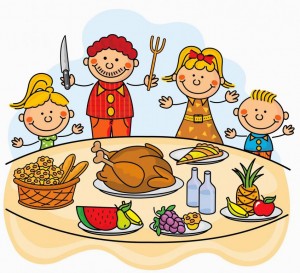Good Grades Start At The Dinner Table
If you’re like most families, you lead a pretty busy life. There are kids to wrangle and spouses to communicate with, dogs to walk and parties to attend, dinners to make and dance recitals to get to. There is always something to do, something on the To-Do list that just never gets checked off. In the craziness of our schedules though, some of life’s most important moments can be missed. One of these important moments is eating dinner together, at a table, not in front of the TV or with headphones on or in private bedrooms. Eating dinner together as a family is an excellent time for kids to build listening and communication skills, for parents to get a peak into what their children are doing all day, a chance for families to discuss important issues and plans, and, believe it or not, provides a foundation for higher academic achievement.
A recent study surveyed 120 boys and girls who did well on their school’s standardized test, and found that almost all of them reported having daily, quality time around the dinner table with their families. Another study done by a Harvard professor showed that children who talk with their parents and siblings in a structured, dinnertime environment are exposed to more vocabulary words than when their parents read to them alone. The structure of group conversation helps chidden learn when to speak, when to listen, how to wait patiently without interrupting, and how to actively participate in group discussions.
If eating together as a family is not something you are implementing, here are some tips to make family dinnertime run smoothly:
- Turn off the TV and music, and don’t allow family members to bring phones, tablets or any other technology to the table
- Ask open ended questions, like “What was the best part of your day?” or “What is something that happened today that made you feel frustrated/annoyed/sad/happy/proud today?” these questions encourage kids to elaborate on their answers, instead of saying “nothing” or “I don’t know.”
- Take turns talking about the events of the day, and ask each other questions to get more details. Ask about what they are learning about in each class, what tests they have coming up, which teachers they like the most, etc. This type of conversation will give you a little more insight into how your child is doing in school
Along with higher test scores, kids who eat dinner with their families report having higher self esteem, healthier relationships with their peers, higher communication skills and are less likely to participate in high-risk behaviors.
Make it a priority to eat dinner together at the table this week, and prepare to see growth in all areas of your child’s life.

